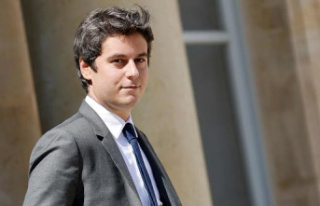Kosovo police dispersed, on Monday, May 29, using tear gas, Serb demonstrators demanding the withdrawal from northern Kosovo, where they are in the majority, of Albanian mayors who have just taken office there. Soldiers from the North Atlantic Treaty Organization (NATO) force deployed in Kosovo (KFOR) intervened, before in turn being thrown stones and incendiary devices.
In the morning, Serb protesters, who also demand the departure of the security forces specially deployed in the region for several days, gathered in front of one of the town halls concerned, that of Zvecan, and tried to enter. . The police immediately repelled them using tear gas, as noted by a journalist from Agence France-Presse (AFP).
In Zvecan, "protesters, resorting to violence and using tear gas, attempted to break through the security cordons and break into the premises of the municipality," police said in a statement. She said that, in total, demonstrations had taken place outside three town halls in the north of the Kosovo territory where many ethnic Serbs live who remained loyal to Belgrade and rejected the proclaimed independence of Kosovo in 2008, a former province of Serbia.
Stones and "incendiary devices" against KFOR
KFOR, which urges Belgrade and Pristina to resume the dialogue that had begun under the auspices of the European Union, had positioned around 50 Polish and Hungarian soldiers around the Zvecan town hall, according to the AFP journalist. The latter initially tried to separate the demonstrators from the police, but then began to disperse the crowd using tear gas and flash grenades. The protesters retaliated by throwing stones at the soldiers, but were quickly pushed back a few hundred meters from the building.
“NATO strongly condemns the unprovoked attacks against KFOR troops in northern Kosovo, which resulted in a number of injuries. These attacks are completely unacceptable. The violence must stop immediately,” an Alliance spokesperson said. The clashes injured some thirty KFOR troops.
According to the Hungarian Ministry of Defence, more than twenty Hungarian soldiers are among the injured, seven of whom were seriously injured. Italian Foreign Minister Antonio Tajani tweeted that eleven Italian soldiers were injured, "three of whom are in serious condition".
The soldiers "were the target of unprovoked attacks and suffered traumatic injuries with broken bones and burns from the explosion of incendiary devices," KFOR said in a statement, referring to "approximately 25 soldiers" injured.
Two media teams in Pristina also claimed that protesters had slashed the tires of their vehicles and sprayed them with paint.
Italian Prime Minister Giorgia Meloni issued her "strongest condemnation" after the "attack on the KFOR mission". "It is fundamental to avoid further unilateral actions by the Kosovo authorities and for all parties to immediately take a step back to reduce tensions," she said in a statement.
Serbian army on high alert
At least 52 Serbs were injured in the incidents, three of them seriously, Serbian President Aleksandar Vucic said in Belgrade, adding that a 50-year-old man was shot and wounded by Kosovar police "special forces". .
The Serbs, whose political representatives left the local institutions in northern Kosovo in November, boycotted the municipal elections organized by the Kosovar government in April to put an end to this institutional vacuum. The elected officials on this occasion, whom the protesters do not consider to be their legitimate representatives, were elected with a very low turnout: only some 1,500 voters, out of approximately 45,000 registered voters, took part.
Incidents had already occurred in this region on Friday when these ethnic Albanian mayors went to take office accompanied by the police. Aleksandar Vucic, who on Friday ordered the Serbian army to be on high alert, as has regularly been the case in recent years, said Monday evening that the units dispatched near the border with Kosovo were deployed to "essential" positions.
"We will not allow a pogrom of the Serbian people," he said, calling on "the international community to bring [Kosovo's prime minister] Albin Kurti to his senses." "If they don't do that, I'm afraid it's too late for all of us," he added.
"Kosovo is the heart of Serbia", says Novak Djokovic
At Roland Garros, Serbian star Novak Djokovic, whose father was born in Kosovo, spoke about the situation at the end of his debut match against American Aleksandar Kovacevic. “Kosovo is the heart of Serbia. Stop the violence,” he wrote on a camera lens. "Kosovo is our cradle, our stronghold, the center of the most important things for our country," the player told Serbian media in Paris.
Fever flare-ups are common in northern Kosovo. Some 120,000 Serbs live in this country of 1.8 million inhabitants, overwhelmingly Albanian.
The United States, France, the United Kingdom, Italy and Germany on Friday urged the Kosovo authorities "to immediately reverse their decision" to deploy their special forces, also saying they were "concerned by the decision of Serbia to raise the level of readiness" of its army.












